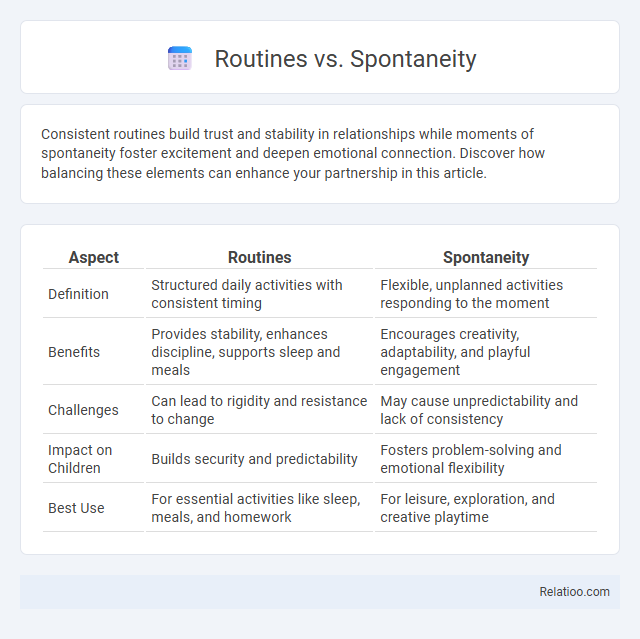Consistent routines build trust and stability in relationships while moments of spontaneity foster excitement and deepen emotional connection. Discover how balancing these elements can enhance your partnership in this article.
Table of Comparison
| Aspect | Routines | Spontaneity |
|---|---|---|
| Definition | Structured daily activities with consistent timing | Flexible, unplanned activities responding to the moment |
| Benefits | Provides stability, enhances discipline, supports sleep and meals | Encourages creativity, adaptability, and playful engagement |
| Challenges | Can lead to rigidity and resistance to change | May cause unpredictability and lack of consistency |
| Impact on Children | Builds security and predictability | Fosters problem-solving and emotional flexibility |
| Best Use | For essential activities like sleep, meals, and homework | For leisure, exploration, and creative playtime |
Understanding Routines: Structure in Daily Life
Routines provide a structured framework that enhances productivity, reduces decision fatigue, and fosters consistency in daily activities. Establishing clear routines aligns with circadian rhythms, improving mental clarity and emotional stability. This structured approach supports goal achievement by creating predictable patterns that streamline time management and reinforce positive habits.
The Value of Spontaneity: Embracing the Unexpected
Embracing spontaneity allows you to break free from rigid routines and structured plans, fostering creativity and adaptability in daily life. The value of spontaneity lies in its power to create unexpected opportunities for joy, personal growth, and memorable experiences. Balancing spontaneity with structure ensures that you remain grounded while fully appreciating the excitement and benefits of the unpredictable.
Psychological Benefits of Routine
Routine provides psychological benefits by enhancing mental clarity and reducing decision fatigue through predictable patterns. Establishing structured daily habits supports emotional stability, decreases anxiety, and improves overall cognitive function. Consistent routines promote a sense of control and security, which strengthens resilience against stress.
The Creative Power of Spontaneous Living
Spontaneous living unlocks your creative potential by fostering flexibility and openness to new experiences, which structured routines often limit. Embracing spontaneity allows your mind to explore unconventional ideas, enhancing problem-solving and innovation. Balancing structure with moments of unpredictability empowers your creativity to thrive without the constraints of rigid schedules.
Productivity: Routine vs Spontaneity
Routines create consistent habits that enhance your productivity by reducing decision fatigue and ensuring focused time for important tasks. Spontaneity can inject creative energy and adaptability but may disrupt workflow and lead to inconsistent output. Balancing routine with moments of flexibility helps maintain steady progress while allowing space for innovation.
Stress Management: Predictability vs Flexibility
Routines provide predictability that reduces stress by creating a stable environment where expectations and actions align, fostering a sense of control and safety. Spontaneity introduces flexibility, allowing for creative problem-solving and relief from monotony, which can alleviate stress linked to rigid schedules. Balancing structured routines with moments of unplanned activity optimizes stress management by combining consistency's calming effects with spontaneity's adaptive benefits.
Building Healthy Habits through Routine
Building healthy habits through routine enhances consistency and reinforces positive behavior patterns by creating a predictable framework for your daily actions. Structured routines reduce decision fatigue and increase productivity by automating beneficial habits, allowing your mind to focus on higher-priority tasks. Balancing routine with occasional spontaneity ensures flexibility and prevents monotony, supporting long-term commitment to personal growth and well-being.
The Role of Spontaneity in Personal Growth
Spontaneity plays a crucial role in personal growth by encouraging adaptability, creativity, and resilience, which structured routines alone may not provide. Your ability to embrace unplanned experiences fosters emotional flexibility and self-discovery, unlocking new perspectives and skills. Balancing spontaneity with routine creates an optimal environment for continuous learning and meaningful development.
Balancing Routine and Spontaneity: Strategies for Success
Balancing routine and spontaneity requires integrating structured habits that provide stability while allowing room for flexibility to adapt and embrace unexpected opportunities. Your success depends on setting clear priorities within a routine framework, then deliberately scheduling moments for unplanned activities that boost creativity and reduce burnout. Incorporating techniques such as time blocking with open slots ensures that both consistent productivity and spontaneous inspiration coexist harmoniously in your daily life.
Choosing What Works: Personalizing Your Approach
Choosing what works for your lifestyle involves balancing routines, spontaneity, and structure to optimize productivity and well-being. Personalized approaches that align with individual preferences and goals foster consistency while allowing flexibility for creativity and adaptability. Tailoring time management to incorporate habitual patterns alongside moments of unplanned freedom enhances motivation and reduces stress.

Infographic: Routines vs Spontaneity
 relatioo.com
relatioo.com